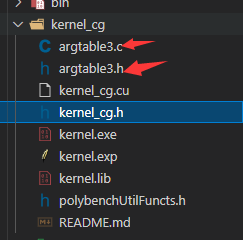### argtable3 使用指南 今天做项目需要在c语言里面解析命令行,然后我看了一下getopt()发现在linux下才能很方便的使用(在Windows下需要进行相关的配置),然后我记得之前看过有个[项目(QDUOJ的核心)](https://github.com/QingdaoU/Judger)的源码中使用了argtable3,觉得还挺方便的。 ## 一、引入头文件和如何编译 #### 1.引入头文件 ```c++ #include "argtable3.h" ``` 头文件可以在官方的github上下载[Releases · argtable/argtable3 (github.com)](https://github.com/argtable/argtable3/releases/) 下载带有amalgamation的文件  然后解压会有  将源文件和头文件拷贝到项目目录  ### 2.编译 在Windows下面使用VC可以 ```bash cl.exe kernel.c argtable3.c -o kernel ``` 在Linux下使用GCC ```bash gcc kernel.c argtable3.c -o kernel ``` ## 二、开始使用 #### 1. 设置需要的参数 argtable3设置了多种参数的类型,我在下面一一介绍一下。 ##### (1). arg_hdr ```c++ typedef struct arg_hdr { char flag; /* Modifier flags: ARG_TERMINATOR, ARG_HASVALUE. */ const char* shortopts; /* String defining the short options */ const char* longopts; /* String defiing the long options */ const char* datatype; /* Description of the argument data type */ const char* glossary; /* Description of the option as shown by arg_print_glossary function */ int mincount; /* Minimum number of occurences of this option accepted */ int maxcount; /* Maximum number of occurences if this option accepted */ void* parent; /* Pointer to parent arg_xxx struct */ arg_resetfn* resetfn; /* Pointer to parent arg_xxx reset function */ arg_scanfn* scanfn; /* Pointer to parent arg_xxx scan function */ arg_checkfn* checkfn; /* Pointer to parent arg_xxx check function */ arg_errorfn* errorfn; /* Pointer to parent arg_xxx error function */ void* priv; /* Pointer to private header data for use by arg_xxx functions */ } arg_hdr_t; ``` 最基本的一个类型,所有的其他类型都包含这个类型。我一一解释下里面的参数的含义 - shortopts: 参数的短名称,比如ls -a 中的a就是短名称。 - longopts: 参数中的长名称,比如ls --all 中的all就是长名称。 - datatype: 参数的数据类型有<int>, <double>, NULL,<file> ,(时间类型传入format字符串),(rex类型传入匹配串),<string>等 - glossary: 对于参数的描述 - mincount: 参数最少的个数(可以规定是否必须有参数比如设置为0为非必须,1...n为必须) - maxcount: 参数最多的个数,采用Unix风格的,如kernel.exe -l 1 -l 2 -l 3 - 其他参数非必须 ##### (2). arg_lit (文字) ```c++ typedef struct arg_lit { struct arg_hdr hdr; /* The mandatory argtable header struct */ int count; /* Number of matching command line args */ } arg_lit_t; ``` ##### (3). arg_int(整数) ```c++ typedef struct arg_int { struct arg_hdr hdr; /* The mandatory argtable header struct */ int count; /* Number of matching command line args */ int* ival; /* Array of parsed argument values */ } arg_int_t; ``` 其中ival指获得的参数的值得一个数组,count表示获得了多少个值。 ##### (4). arg_dbl(双精度浮点数) ```c++ typedef struct arg_dbl { struct arg_hdr hdr; /* The mandatory argtable header struct */ int count; /* Number of matching command line args */ double* dval; /* Array of parsed argument values */ } arg_dbl_t; ``` ```c++ // 模式匹配 typedef struct arg_rex { struct arg_hdr hdr; /* The mandatory argtable header struct */ int count; /* Number of matching command line args */ const char** sval; /* Array of parsed argument values */ } arg_rex_t; // 文件 typedef struct arg_file { struct arg_hdr hdr; /* The mandatory argtable header struct */ int count; /* Number of matching command line args*/ const char** filename; /* Array of parsed filenames (eg: /home/foo.bar) */ const char** basename; /* Array of parsed basenames (eg: foo.bar) */ const char** extension; /* Array of parsed extensions (eg: .bar) */ } arg_file_t; // 时间 typedef struct arg_date { struct arg_hdr hdr; /* The mandatory argtable header struct */ const char* format; /* strptime format string used to parse the date */ int count; /* Number of matching command line args */ struct tm* tmval; /* Array of parsed time values */ } arg_date_t; ``` #### 2. 初始化参数(创建空间) - 这里我直接在注释里面说明 ```c++ #include "argtable3.h" struct arg_int *gpu, *cpu, *opreator, *tn, *l, *r; struct arg_dbl *fc; struct arg_lit *verb, *help, *version; struct arg_end *end; #define VERSION 0x020101 void parse_args(int argc, char* argv[]) { // 初始化一个列表表示参数列表 void *argtable[] = { // arg_litn初始化help,其中h为短参数名,help为长参数名,0为mincount,1为maxcount,后面字符串为提示,其中lit可以省略类型 // litn可以用简便的比如arg_lit0("h", "help", "xxxxxxxx")表示下面的 // lit1("h", "help", "xxxxxxx")可以表示mincount=1,maxcount=1 help = arg_litn("h", "help", 0, 1, "Display Thie Help and Exit"), version = arg_litn("v", "version", 0, 1, "Display Version Info And Exit"), // 类似同上,只是加了一个类型表示 cpu = arg_intn("c", "cpu_number","<int>", 0, 1, "The CPU Number, Default is 1"), gpu = arg_intn("g", "gpu_number","<int>", 0, 1, "The GPU number, default is 1"), opreator = arg_intn("o", "op", "<int>",0, 1, "The opreator of expression default is +(1): 1 is + and -1 is -"), tn = arg_intn("t", "threadnum", "<int>",0, 1, "Per CPU Run The Thread Number"), fc = arg_dbln("f", "factor", "<double>",0, 1, "The Factor of Expression, default is 1.0"), l = arg_intn("l", "left", "<int>", 0, 3, "The factor for left expression, default is 1,1,1, exp: -l 1 -l 1 -l 1"), r = arg_intn("r", "right", "<int>", 0, 3, "The factor for right expression, default is 1,1,1,exp -r 1 -r 1 -r 1"), end = arg_end(10), }; int exitcode = 0; char name[] = "kernel.exe"; // 解析参数 int nerrors = arg_parse(argc, argv, argtable); // count > 0表示有参数 if (help->count > 0) { printf("Usage: %s", name); arg_print_syntax(stdout, argtable, "\n\n"); arg_print_glossary(stdout, argtable, " %-25s %s\n"); goto exit; } if (version->count > 0) { printf("Version: %d.%d.%d\n", (VERSION >> 16) & 0xff, (VERSION >> 8) & 0xff, VERSION & 0xff); goto exit; } if (nerrors > 0) { // 错误处理 arg_print_errors(stdout, end, name); printf("Try '%s --help' for more information.\n", name); exitcode = 1; goto exit; } if (cpu->count > 0) { CUDA_CONF::CPUn = cpu->ival[0]; } if (gpu->count > 0) { CUDA_CONF::GPUn = gpu->ival[0]; } if (opreator->count > 0) { CALCULATE_CONF::op = opreator->ival[0]; } if (tn->count > 0) { CUDA_CONF::threadnum = tn->ival[0]; } if (fc->count > 0) { CALCULATE_CONF::factor = fc->dval[0]; } if (l->count > 0) { for (int i = 0; i < l->count; i++) { CALCULATE_CONF::left[i] = l->ival[i]; } } // 拥有多个参数处理 if (r->count > 0) { for (int i = 0; i < r->count; i++) { CALCULATE_CONF::right[i] = r->ival[i]; } } printf("CPUn is %d, GPUn is %d, op is %d, factor is %lf\n", CUDA_CONF::CPUn, CUDA_CONF::GPUn, CALCULATE_CONF::op, CALCULATE_CONF::factor); run(); exit: // 释放参数列表 arg_freetable(argtable, sizeof(argtable) / sizeof(argtable[0])); return; } ``` 最后修改:2021 年 08 月 06 日 © 允许规范转载 打赏 赞赏作者 支付宝微信 赞 如果觉得我的文章对你有用,请随意赞赏